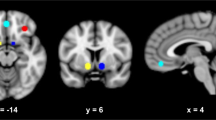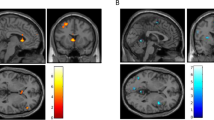Abstract
We previously reported that at 1-and-4 weeks of sobriety, those who relapsed after treatment demonstrated significantly smaller total frontal cortical volume than individuals who maintained abstinence for at least 12 months post treatment. The segmentation method employed did not permit examination of frontal subregions that serve as nodes of the executive, salience and emotional regulation networks; structural abnormalities in these circuits are associated with relapse in those seeking treatment for alcohol use disorders (AUD). The primary goal of this study was to determine if frontal cortical subregion volume recovery during early abstinence is associated with long-term abstinence from alcohol. We compared bilateral components of the dorsal prefrontal cortex, orbitofrontal cortex, anterior cingulate cortex and insula volumes, at 1 and 4 weeks of abstinence, between individuals who resumed drinking within 12 months of treatment (Relapsers) those who showed sustained abstinence over 12 months following treatment (Abstainers) and healthy Controls. At 1 and 4 weeks of sobriety, Relapsers demonstrated significantly smaller volumes than Controls in 15 of 20 regions of interest, while Abstainers only had smaller volumes than Controls in 5 of 20 regions. In Relapsers, increasing volumes over 1 month in multiple frontal subregions and the insula were associated with longer duration of abstinence after treatment. The persistent bilateral frontal and insula volume deficits in Relapsers over 4 weeks from last alcohol use may have implications for neurostimulation methods targeting anterior frontal/insula regions, and represent an endophenotype that differentiates those who respond more favorably to available psychosocial and pharmacological interventions.



Similar content being viewed by others
References
Bates, M. E., Buckman, J. F., & Nguyen, T. T. (2013). A role for cognitive rehabilitation in increasing the effectiveness of treatment for alcohol use disorders. Neuropsychology Review, 23(1), 27–47. https://doi.org/10.1007/s11065-013-9228-3.
Beck, A., Wustenberg, T., Genauck, A., Wrase, J., Schlagenhauf, F., Smolka, M. N., . . . Heinz, A. (2012). Effect of brain structure, brain function, and brain connectivity on relapse in alcohol-dependent patients. Archives of General Psychiatry, 69(8), 842–852. https://doi.org/10.1001/archgenpsychiatry.2011.2026.
Bellamoli, E., Manganotti, P., Schwartz, R. P., Rimondo, C., Gomma, M., & Serpelloni, G. (2014). rTMS in the treatment of drug addiction: An update about human studies. Behavioural Neurology, 2014, 815215. https://doi.org/10.1155/2014/815215.
Buhler, M., & Mann, K. (2011). Alcohol and the human brain: A systematic review of different neuroimaging methods. Alcoholism, Clinical and Experimental Research, 35(10), 1771–1793. https://doi.org/10.1111/j.1530-0277.2011.01540.x.
Cardenas, V. A., Durazzo, T. C., Gazdzinski, S., Mon, A., Studholme, C., & Meyerhoff, D. J. (2011). Brain morphology at entry into treatment for alcohol dependence is related to relapse propensity. Biological Psychiatry, 70(6), 561–567. https://doi.org/10.1016/j.biopsych.2011.04.003.
Cohen, J. (1977). Statistical power analysis for the behavioral sciences (rev. ed.). New York: Academic Press.
Dunlop, K., Hanlon, C. A., & Downar, J. (2017). Noninvasive brain stimulation treatments for addiction and major depression. Annals of the New York Academy of Sciences, 1394(1), 31–54. https://doi.org/10.1111/nyas.12985.
Durazzo, T. C., & Meyerhoff, D. J. (2017). Psychiatric, demographic, and brain morphological predictors of relapse after treatment for an alcohol use disorder. Alcoholism, Clinical and Experimental Research, 41(1), 107–116. https://doi.org/10.1111/acer.13267.
Durazzo, T. C., Gazdzinski, S., Yeh, P. H., & Meyerhoff, D. J. (2008). Combined neuroimaging, neurocognitive and psychiatric factors to predict alcohol consumption following treatment for alcohol dependence. Alcohol and Alcoholism, 43(6), 683–691. https://doi.org/10.1093/alcalc/agn078.
Durazzo, T. C., Tosun, D., Buckley, S., Gazdzinski, S., Mon, A., Fryer, S. L., & Meyerhoff, D. J. (2011). Cortical thickness, surface area, and volume of the brain reward system in alcohol dependence: Relationships to relapse and extended abstinence. Alcoholism, Clinical and Experimental Research, 35(6), 1187–1200. https://doi.org/10.1111/j.1530-0277.2011.01452.x.
Durazzo, T. C., Mon, A., Pennington, D., Abe, C., Gazdzinski, S., & Meyerhoff, D. J. (2014). Interactive effects of chronic cigarette smoking and age on brain volumes in controls and alcohol-dependent individuals in early abstinence. Addiction Biology, 19(1), 132–143. https://doi.org/10.1111/j.1369-1600.2012.00492.x.
Durazzo, T. C., Mon, A., Gazdzinski, S., Yeh, P. H., & Meyerhoff, D. J. (2015). Serial longitudinal magnetic resonance imaging data indicate non-linear regional gray matter volume recovery in abstinent alcohol-dependent individuals. Addiction Biology, 20(5), 956–967. https://doi.org/10.1111/adb.12180.
Durazzo, T. C., Mon, A., Gazdzinski, S., & Meyerhoff, D. J. (2016). Regional brain volume changes in alcohol-dependent individuals during early abstinence: Associations with relapse following treatment. Addiction Biology, 22, 1416–1425. https://doi.org/10.1111/adb.12420.
Fettes, P., Schulze, L., & Downar, J. (2017). Cortico-striatal-thalamic loop circuits of the orbitofrontal cortex: Promising therapeutic targets in psychiatric illness. Frontiers in Systems Neuroscience, 11, 25. https://doi.org/10.3389/fnsys.2017.00025.
Fischl, B., van der Kouwe, A., Destrieux, C., Halgren, E., Segonne, F., Salat, D.H., Busa, E., Seidman, L.J., Goldstein, J., Kennedy, D., Caviness, V., Makris, N., Rosen, B., Dale, A.M. (2004). Automatically parcellating the human cerebral cortex. Cerebral cortex, 14, 11–22
George, M. S., Bohning, D. E., Lorberbaum, J. P., Nahas, Z., Anderson, B., Borckardt, J. J., Molnar, C., Kose, S., Ricci, R., & Rostogi, K. (2007). Overview of transcranial magnetic stimulation: History mechanisms physics and safety. In M. S. George & R. H. Belmaker (Eds.), Transcranial magnetic stimulation in clinical psychiatry (pp. 1–38). Washington, DC; London: American Psychiatric Publishing, Inc..
Grant, B. F., Goldstein, R. B., Saha, T. D., Chou, S. P., Jung, J., Zhang, H., . . . Hasin, D. S. (2015). Epidemiology of DSM-5 alcohol use disorder: Results from the National Epidemiologic Survey on alcohol and related conditions III. JAMA Psychiatry, 72(8), 757–766. https://doi.org/10.1001/jamapsychiatry.2015.0584.
Mertens, J. R., Weisner, C., Ray, G. T., Fireman, B., & Walsh, K. (2005). Hazardous drinkers and drug users in HMO primary care: Prevalence, medical conditions, and costs. Alcoholism, Clinical and Experimental Research, 29(6), 989–998.
Meyerhoff, D. J., Durazzo, T. C., & Ende, G. (2013). Chronic alcohol consumption, abstinence and relapse: Brain proton magnetic resonance spectroscopy studies in animals and humans. Current Topics in Behavioral Neurosciences, 13, 511–540. https://doi.org/10.1007/7854_2011_131.
Mon, A., Durazzo, T. C., Gazdzinski, S., Hutchison, K. E., Pennington, D., & Meyerhoff, D. J. (2013). Brain-derived neurotrophic factor (BDNF) genotype is associated with lobar gray and white matter volume recovery in abstinent alcohol dependent individuals. Genes, Brain, and Behavior, 12(1), 98–107. https://doi.org/10.1111/j.1601-183X.2012.00854.x.
Moorman, D. E. (2018). The role of the orbitofrontal cortex in alcohol use, abuse, and dependence. Progress in Neuro-Psychopharmacology & Biological Psychiatry, 87(Pt A, 85–107. https://doi.org/10.1016/j.pnpbp.2018.01.010.
Paulus, M. P. (2007). Neural basis of reward and craving--a homeostatic point of view. Dialogues in Clinical Neuroscience, 9(4), 379–387.
Pennington, D. L., Durazzo, T. C., Schmidt, T., Mon, A., Abe, C., & Meyerhoff, D. J. (2013). The effects of chronic cigarette smoking on cognitive recovery during early abstinence from alcohol. Alc Clin Exp Research, 37(7), 1220–1227. https://doi.org/10.1111/acer.12089.
Rando, K., Hong, K. I., Bhagwagar, Z., Li, C. S., Bergquist, K., Guarnaccia, J., & Sinha, R. (2011). Association of frontal and posterior cortical gray matter volume with time to alcohol relapse: A prospective study. The American Journal of Psychiatry, 168(2), 183–192. https://doi.org/10.1176/appi.ajp.2010.10020233.
Reuter, M., Schmansky, N. J., Rosas, H. D., & Fischl, B. (2012). Within-subject template estimation for unbiased longitudinal image analysis. Neuroimage, 61(4), 1402–1418. https://doi.org/10.1016/j.neuroimage.2012.02.084.
Rolls, E. T., & Grabenhorst, F. (2008). The orbitofrontal cortex and beyond: From affect to decision-making. Progress in Neurobiology, 86(3), 216–244. https://doi.org/10.1016/j.pneurobio.2008.09.001.
Salling, M. C., & Martinez, D. (2016). Brain stimulation in addiction. Neuropsychopharmacology, 41(12), 2798–2809. https://doi.org/10.1038/npp.2016.80.
Sankoh, A. J., Huque, M. F., & Dubey, S. D. (1997). Some comments on frequently used multiple endpoint adjustment methods in clinical trials. Statistics in Medicine, 16(22), 2529–2542.
Seeley, W. W., Menon, V., Schatzberg, A. F., Keller, J., Glover, G. H., Kenna, H., . . . Greicius, M. D. (2007). Dissociable intrinsic connectivity networks for salience processing and executive control. The Journal of Neuroscience, 27(9), 2349–2356. https://doi.org/10.1523/jneurosci.5587-06.2007.
Seo, D., & Sinha, R. (2014). The neurobiology of alcohol craving and relapse. Handbook of Clinical Neurology, 125, 355–368. https://doi.org/10.1016/b978-0-444-62619-6.00021-5.
Seo, D., & Sinha, R. (2015). Neuroplasticity and predictors of alcohol recovery. Alcohol Research: Current Reviews, 37(1), 143–152.
Seo, S., Mohr, J., Beck, A., Wustenberg, T., Heinz, A., & Obermayer, K. (2015). Predicting the future relapse of alcohol-dependent patients from structural and functional brain images. Addiction Biology, 20(6), 1042–1055. https://doi.org/10.1111/adb.12302.
Sobell, L. C., Sobell, M. B., Maisto, S. A., & Cooper, A. M. (1985). Time-line follow-back assessment method. NIAAA treatment handbook series (Vol. 2, pp. 85–1380).
Sobell, L. C., Sobell, M. B., Riley, D. M., Schuller, R., Pavan, D. S., Cancilla, A., . . . Leo, G. I. (1988). The reliability of alcohol abusers' self-reports of drinking and life events that occurred in the distant past. Journal of Studies on Alcohol, 49(3), 225–232.
Stokes, M. G., Chambers, C. D., Gould, I. C., Henderson, T. R., Janko, N. E., Allen, N. B., & Mattingley, J. B. (2005). Simple metric for scaling motor threshold based on scalp-cortex distance: Application to studies using transcranial magnetic stimulation. Journal of Neurophysiology, 94(6), 4520–4527. https://doi.org/10.1152/jn.00067.2005.
Stokes, M. G., Chambers, C. D., Gould, I. C., English, T., McNaught, E., McDonald, O., & Mattingley, J. B. (2007). Distance-adjusted motor threshold for transcranial magnetic stimulation. Clinical Neurophysiology, 118(7), 1617–1625. https://doi.org/10.1016/j.clinph.2007.04.004.
Tessner, K. D., & Hill, S. Y. (2010). Neural circuitry associated with risk for alcohol use disorders. Neuropsychology Review, 20(1), 1–20. https://doi.org/10.1007/s11065-009-9111-4.
Volkow, N. D., & Baler, R. D. (2014). Addiction science: Uncovering neurobiological complexity. Neuropharmacology, 76 Pt B, 235–249. https://doi.org/10.1016/j.neuropharm.2013.05.007.
Volkow, N. D., Wang, G. J., Tomasi, D., & Baler, R. D. (2013). Unbalanced neuronal circuits in addiction. Current Opinion in Neurobiology, 23(4), 639–648. https://doi.org/10.1016/j.conb.2013.01.002.
Williams, L. M. (2016). Precision psychiatry: A neural circuit taxonomy for depression and anxiety. Lancet Psychiatry, 3(5), 472–480. https://doi.org/10.1016/s2215-0366(15)00579-9.
Witkiewitz, K. (2011). Predictors of heavy drinking during and following treatment. Psychology of Addictive Behaviors, 25(3), 426–438. https://doi.org/10.1037/a0022889.
Witkiewitz, K., & Marlatt, G. A. (2007). Modeling the complexity of post-treatment drinking: it's a rocky road to relapse. Clinical Psychology Review, 27(6), 724–738. https://doi.org/10.1016/j.cpr.2007.01.002.
Acknowledgments
This study was supported by National Institutes of Health (AA10788 to DJM and DA24136 to TCD) and Department of Veterans Affairs (RX002303 to TCD) with resources and use of facilities at the San Francisco VA Medical Center and the VA Palo Alto Health Care System. We thank Dr. Ellen Herbst, Ricky Chen and colleagues of the San Francisco Veterans Administration Substance Abuse Day Hospital and Dr. David Pating and colleagues at the Kaiser Permanente Chemical Dependency Recovery Program in San Francisco for their valuable assistance in participant recruitment. We thank Drs. Stefan Gazdzinski and Anderson Mon for MRI data acquisition, Dr. Xiaowei Zou for longitudinal FreeSurfer data processing, and Mr. Thomas Schmidt for assistance with psychiatric assessments and cohort maintenance. We also extend our gratitude to our participants, who made this research possible.
Funding
National Institutes of Health (AA10788 to Dieter J. Meyerhoff and DA24136 to Timothy C. Durazzo) and Department of Veterans Affairs (RX002303 to Timothy C. Durazzo) with resources and use of facilities at the San Francisco VA Medical Center and the VA Palo Alto Health Care System.
Author information
Authors and Affiliations
Corresponding author
Ethics declarations
Conflict of interest
The Authors received funding from the National Institutes and Department of Veterans Affairs. The Authors have no conflicts of interest to report.
Ethical approval
All procedures performed in this study involving human participants were in accordance with the ethical standards of institutional review boards of the University of California San Francisco and the San Francisco VA Medical Center and with the 1964 Helsinki declaration and its later amendments or comparable ethical standards.
Informed consent
Written informed consent was obtained from all participants included in the study prior to involvement in any research-related procedures.
Additional information
Publisher’s note
Springer Nature remains neutral with regard to jurisdictional claims in published maps and institutional affiliations.
Rights and permissions
About this article
Cite this article
Durazzo, T.C., Meyerhoff, D.J. Changes of frontal cortical subregion volumes in alcohol dependent individuals during early abstinence: associations with treatment outcome. Brain Imaging and Behavior 14, 1588–1599 (2020). https://doi.org/10.1007/s11682-019-00089-5
Published:
Issue Date:
DOI: https://doi.org/10.1007/s11682-019-00089-5




